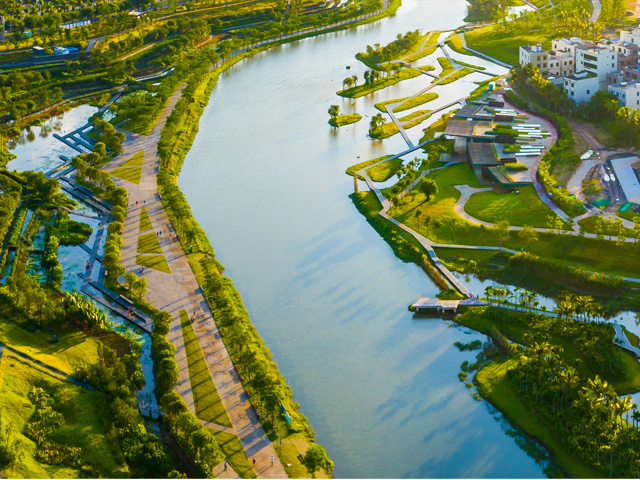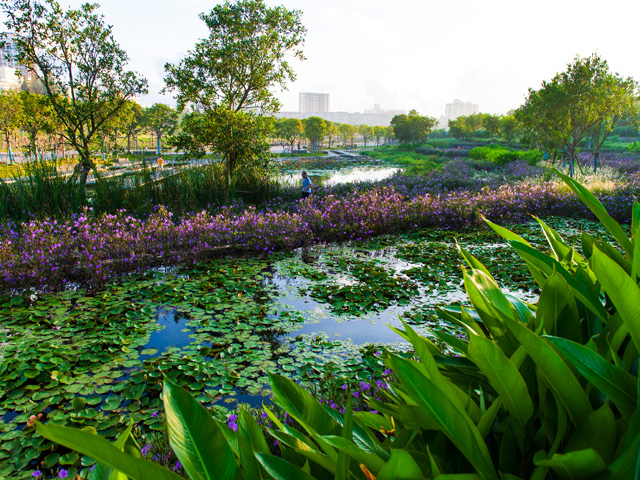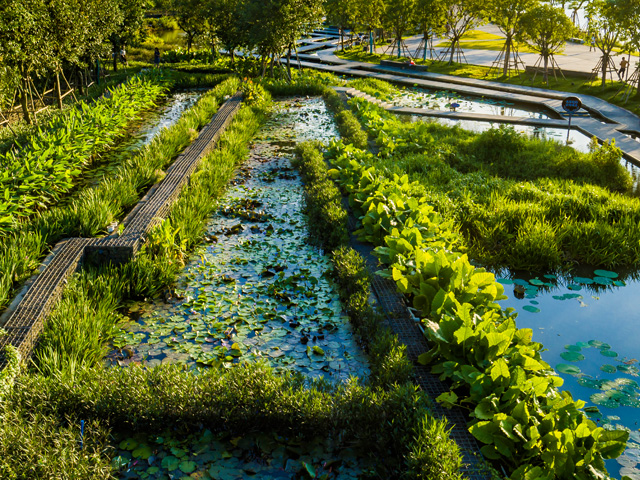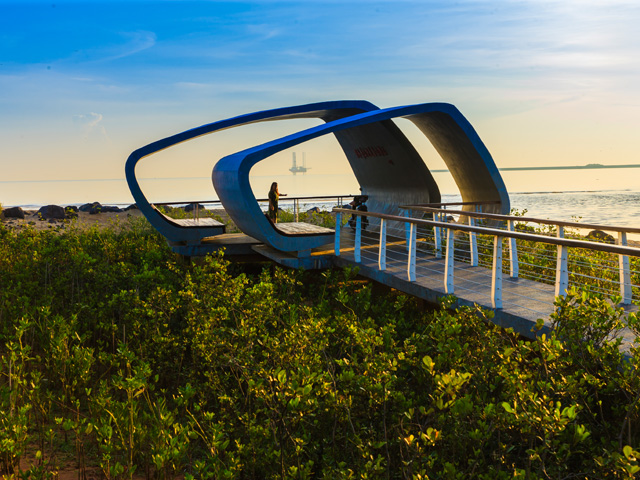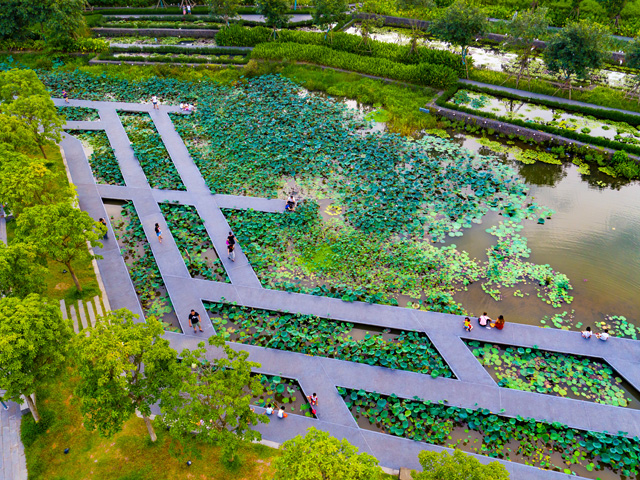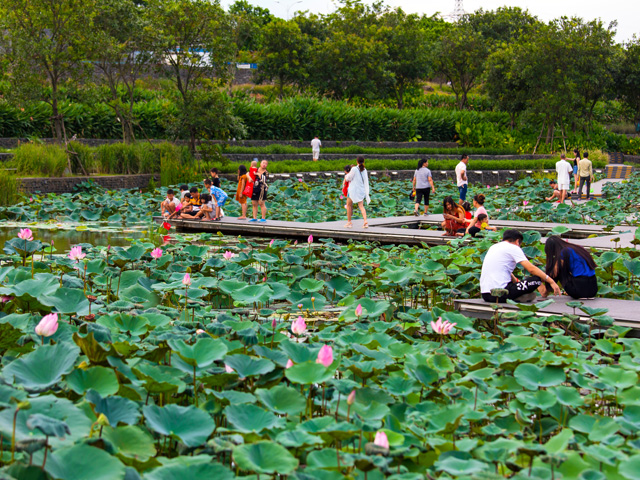NATURE-BASED GREENSCAPES
Meishe River Greenway and Fengxiang Park is a stunning example of deep-form water cleansing ecologies in public spaces.
A not uncommon condition in many Asian cities, China’s Haikou City has been ravaged by monsoons for time immemorial, causing city-wide flooding and the resultant pollution issues resulting from sewage and urban runoff. Rivers channelled by concrete to control flooding had become lifeless and unable to support a healthy ecology in urban areas. Turning the tide on this situation, landscape architecture firm Turenscape is responsible for creating Meishe River Greenway and Fengxiang Park, turning a once concrete wasteland into a resilient green infrastructure.
Implementing nature-based solutions, Turenscape was able to revive the river with clean water to support not only the human inhabitants with lush beauty and social amenity, but also the flourishing of native flora and fauna. By removing concrete flood walls and replacing them with eco-friendly, flood-resilient waterways, mangrove habitats have been rehabilitated and additional wetlands constructed along the riverbeds contain and cleanse contaminated runoff. In addition, recreational facilities have been integrated into the ecological infrastructure, bringing humans into the natural scheme in a harmonious and healthy symbiotic relationship.
A tourist city in the tropical region of South China, Haikou has experienced rapid growth in the past 40 years — taking the city’s population up to 2.3 million. Such population advancement was accompanied by sprouting skyscrapers that paid little attention to the natural water system or urban water infrastructure.
Running through the urban landscape, the Meishe River, a 23-kilometre-long waterway, became a dumping ground for the built-up area; a sewage dump that did nothing to support the urban life it dissected. Despite unsuccessful, half-hearted attempts to beautify and improve the area, the region continued to deteriorate, becoming a public shame.
Taking a more systematic approach, the Government, in 2016, began to implement a more holistic scheme, commissioning a landscape architecture firm, Turenscape, to revive the river and create a public park. Fengziang Park is about 200 acres in size, with a linear river corridor stretching 13 kilometres through the densely built-up environment of Haikou.
Adopting three effective strategies, Turenscape was able to integrate a new civil engineering plan that would include a drainage system of sewage pipes and treatment plants to collect the refuse and reroute major pollution sources from the river. The new wet corridor was designed as a comprehensive ecological infrastructure that would solve the concerns of flooding and pollution, while at the same time recover habitats that would improve biodiversity, create pleasant recreation opportunities, and green the city.
Creating a ‘green sponge’ for the city, the Meishe River Greenway and Fengxiang Park scheme has formed a system that separates stormwater from sewage, integrating the river and its tributaries and wetlands while also integrating a pedestrian and recreational network. It has turned grey spaces into green spaces with the removal of flood walls.
Blocked waterways are now reconnected to the ocean, easing tide entry into the city and wetlands, aiding in a natural cleansing and growth process, over which pedestrian access has been designed to create waterfront sites that don’t interfere with natural ecological processes. The project has also generated a terraced wetland park designed as a natural water cleansing facility — cleaning 6000 tons of urban runoff daily, along with 3500 tons of domestic sewage — with treatment equipment removing pathogens that may prove a public health risk before channelling the grey water into the wetlands. The biomass from the wetland is harvested and regularly decomposed into fertilisers for use in the landscape.
Completed in late 2019, the success of the scheme has proven valuable to the city. And the best bit? It’s replicable. Tests prove that nature-based solutions like this scheme can be replicated effectively. Globally, over 85 percent of sewage in urban areas, mainly in developing countries, is untreated, leading to polluted waterways and increased water shortages. While centralised sewage treatment systems are not always economically viable in more isolated regions, nature-based solutions can remediate water quality, negate flooding and create public amenity that provide cultural and social outlets for communities.
___________________________________
PROJECT PARTICULARS
Client Haikou City Government
Location Haikou, China
Architect Cui Kai, Native Design
Environmental Engineer Sangde Co Ltd
Construction Oriental Landscape Co Ltd
Lead Designer Kongjian Yu
Landscape Design Turenscape
COMPANY
Turenscape
E turen@turenscape.com
W turenscape.com/en
